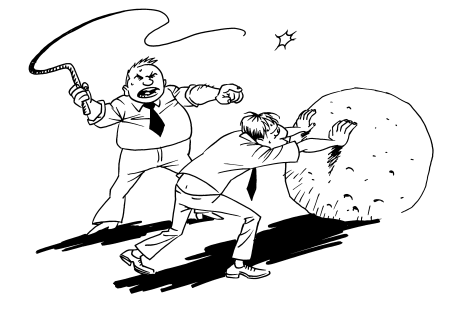
I keep wondering why so many people put up with bad workplaces, bad bosses and bad jobs. Why are many people desperately unhappy at work (up to 50% according to some studies) but accept this as normal?
Here’s why: We’re carrying massive cultural baggage. Through much of Western history, there has been a sense that work is hard and unpleasant and that’s why we get paid to do it.
This is expressed most clearly in Max Weber’s biblically-based work The Protestant Work Ethic, which was used by Protestant preachers to preach that hard labor was good for people, good for Christian society, and a salve for original sin.
According to Christianity, humans used to live in the Garden of Eden, where everything was perfect. But because of original sin we were ejected and, according to Genesis 3:19, this is our situation now:
“By the sweat of your brow you will eat your food until you return to the ground, since from it you were taken; for dust you are and to dust you will return.”
According to Hebrew belief, work is a “curse devised by God explicitly to punish the disobedience and ingratitude of Adam and Eve.” The Old Testament itself supports work, not because there’s any joy in it, but because it is necessary to prevent poverty and destitution.
The ancient Greek word for work is ponos, taken from the Latin poena, which means sorrow. Manual labor was for slaves, while free men were supposed to pursue warfare, large-scale commerce, and the arts, especially architecture or sculpture1.
So, according to our cultural roots, work is a curse, a punishment for original sin, and only for slaves. In short, life is hell—or “nasty, brutish and short,” as Hobbes put it—work is hell, and we must endure it because we’re all sinners but don’t worry, we’ll get our reward once we’re dead! Any questions?
It’s time to put that particular view of work behind us! Richard Reeves has this to say in his excellent book Happy Mondays:
Anybody who thinks work should be miserable simply because it is work or that there should be a cordon sanitaire between “work” and “life” needs to find a time machine, key in the year 1543, and go and join Calvin’s crew. They’ll feel more at home there. In the meantime, the rest of us will get on with enjoying our work, and our workplaces.
But we can never forget that we’re going up against thoughts and beliefs that have been part of our culture for centuries. This is why we need a conscious revolution in workplaces all around the world and why those of us who have chosen to break with the old attitude to work need to support each other.



Leave a Reply